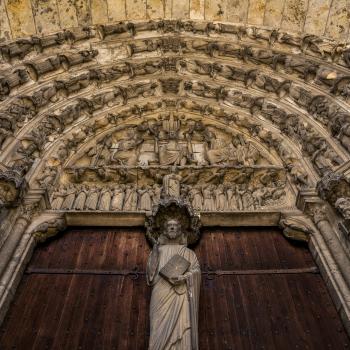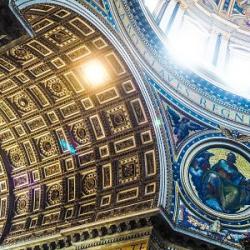In anticipation of the release of Lila
, her latest novel, in early autumn (available for pre-order now!), I am taking a brief break from the series on science and religion to write an ode to Marilynne Robinson’s Pulitzer prize winning novel Gilead. I’ve read this beauty of a novel four times in the past three years and had the privilege of teaching through it thrice while adjuncting at Gordon College. It gets better with every read – one of the marks of a great book. In fact, this very well may be my favorite book I’ve read of any genre in the past three years. So today I am writing to explain why I love Marilynne Robinson’s Gilead.
Gilead is an epistolary novel. This means that it reads less like you’re typical novel and more like a letter. It contains no chapters and only one semi-hard break and that near the very end of the book. Perhaps the best way to describe it is that it’s written in the form of a free-flowing series of journal entries written for another’s eyes. In this way it is much like a fluid memoir. It takes some time to adjust to the slow pace… but stick with it. As silly as it may sound, it could actually change your life.
The novel is essentially the autobiography of John Ames, a Congregationalist pastor in Gilead, a fictitious small-town in Iowa. Ames is old. He is married to a younger woman and they have a very young son. Ames has a weak ticker. He knows he’s dying from some sort of heart condition and so puts pen to paper in order to tell his son the things he would have told him had they had the opportunity to grow up together. Interspersed in the recounting and interpreting of his most formational memories, Ames describes the unfolding drama with Jack Boughton, the prodigal son of Ames’ best friend, the pastor of the Presbyterian Church in Gilead.
I could have and would very much like to follow the spools of thread that, when woven together, are the overwhelmingly beautiful yet homely tapestry of a novel (the kind that I could conceivably hang in my apartment above our $100 pre-loved Ikea couch that would fit in fine and yet make the room). The variety of themes worth exploring include: memory, water, light, vocation, the sacraments, faith, doubt, prayer, narrative, love, loss, loneliness, suffering, family, fatherhood, friendship, and death to name but a few. Perhaps I will try to trace them all one day. For now, I want to engage the text by tracing the thread of Ames’ wonder and reveling in existence. To do this, I’ll identify four reasons why I love Gilead accompanied by large chunks of text from the novel.
1. THIS NOVEL INSPIRES ME TO LOVE THIS WORLD MORE.
It inspires me to celebrate life on earth – the earthiness and physicality of our existence. One of the errors people often fall into is a sort of escapism. This is the idea that the world is cascading into hell in a hand basket and we ought simply to pine for a better home, namely heaven, where we’ll enjoy some sort of disembodied spiritual existence ever after. This simply will not do (see Revelation 21 or almost anything written by NT Wright).
“It has seemed to me sometimes as though the Lord breathes on this poor gray ember of Creation and it turns to radiance – for a moment or a year or the span of a life. And then it sinks back into itself again, and to look at it no one would know it had anything to do with fire, or light…Wherever you turn your eyes the world can shine like transfiguration. You don’t have to bring a thing to it except a little willingness to see. Only, who could have the courage to see it?… Theologians talk about a prevenient grace that precedes grace itself and allows us to accept it. I think there must also be a prevenient courage that allows us to be brave – that is, to acknowledge that there is more beauty than our eyes can bear, that precious things have been put into our hands and to do nothing to honor them is great harm. And therefore, this courage allows us, as the old men say, to make ourselves useful. It allows us to be generous, which is another way of saying exactly the same thing.” (245-246)
“There are two occasions when the sacred beauty of Creation becomes dazzlingly apparent, and they occur together. One is when we feel our mortal insufficiency to the world, and the other is when we feel the world’s mortal insufficiency to us.” (240)
2. THE NOVEL TEACHES ME TO PAY BETTER ATTENTION TO MY LIFE.
There is an attentiveness and awareness that is difficult to bring to bear on life; we so quickly lose our sense of wonder. It’s a shame because there is a paying-attention-to that life deserves. Gilead illustrates that there is profound meaning in to be discovered in the pedestrian, mundane happenings of our comings and goings… if we but have eyes to see.
“I saw a bubble float past my window, fat and wobbly and ripening toward that dragonfly blue they turn just before they burst. So I looked down at the yard and there you were, you and your mother, blowing bubbles at the cat, such a barrage of them that the poor beast was beside herself at the glut of opportunity. She was actually leaping in the air, our insouciant Soapy! Some of the bubbles drifted up through the branches, even above the trees. You two were too intent on the cat to see the celestial consequences of your worldly endeavors. They were very lovely. Your mother is wearing her blue dress and you are wearing your red shirt and you were kneeling on the ground together with Soapy between and that effulgence of bubbles rising, and so much laughter. Ah, this life, this world.” (9)
“That mention of Feuerbach and joy reminded me of something I saw early one morning a few years ago, as I was walking up to the church. There was a young couple strolling along half a block ahead of me. The sun had come up brilliantly after a heavy rain, and the trees were glistening and very wet. On some impulse, plain exuberance, I suppose, the fellow jumped up and caught hold of a branch, and a storm of luminous water came pouring down on the two of them, and they laughed and took off running, the girl sweeping water off her and her dress as if she were a little bit disgusted, but she wasn’t. It was a beautiful thing to see, like something from a myth. I don’t know why I thought of that now, except perhaps because it is easy to believe in such moments that water was made primarily for blessing, and only secondarily for growing vegetables or doing the wash. I wish I had paid more attention to it. My life of regrets may seem unusual, but who can know what they are, really. This is an interesting planet. It deserves all the attention you can give it.” (27-28)
3. THE NOVEL REMINDS ME OF THE MARVEL OF EXISTENCE.
It is an absolute wonder that there is something rather than nothing. Have you ever paused to reflect on the fact that you exist? Or of the miracle of existence at all? There is inherent goodness in existence and it is gift I often take for granted.
“I have been thinking about existence lately. In fact, I have been so full of admiration for existence that I have hardly been able to enjoy it properly. As I was walking up to the church this morning, I passed that row of big oaks by the war memorial – if you remember them – and I thought of another morning, fall a year or two ago, when they were dropping their acorns thick as hail almost. There was all sorts of thrashing in the leaves and there were acorns hitting the pavement so hard they’d fly past my head. All this in the dark of course. I remember a slice of moon, no more than that. It was a very clear night, or morning, very still, and then there was such energy in the things transpiring among those trees, like a storm, like travail. I stood there a little out of range, and I thought, It is all new to me. I have lived my life on the prairie and a line of oak trees can still astonish me.
I feel sometimes as if I were a child who opens its eyes on the world once and sees amazing things it will never know any names for and then has to close its eyes again. I know this is all mere apparition compared to what awaits us, but it is only lovelier for that. There is a human beauty in it. And I can’t believe that, when we have all been changed and put on incorruptibility, we will forget our fantastic condition of mortality and impermanence, the great bright dream of procreating and perishing that meant the whole world to us. In eternity this world will be Troy, I believe, and all that has passed here will be the epic of the universe, the ballad they sing in the streets. Because I don’t imagine any reality putting this one in the shade entirely, and I think piety forbids me try.” (56-57)
4. IT IMPRESSES UPON ME THE GLORY OF HUMANITY AND CENTRALITY OF RELATIONSHIP.
We all have an inherit preciousness because of the imago Dei. I’ve heard that the Orthodox Church views the transfiguration (Mt. 17; Mk. 9; Lk. 9) differently than we often do in the West. I think we often assume that when Jesus is transfigured before Peter, James and John, this is due to his divinity being revealed or unmasked. The Orthodox believe that the transfiguration was not when the disciples saw Jesus as God but when they saw him as fully human. There seems to be at least something to this, especially in light of passages like Psalm 8 where man is crowned by God with glory and honor.
This is why C.S. Lewis could speak the following in a popular sermon in Oxford, which we now refer to as The Weight of Glory: “It is a serious thing to live in a society of possible gods and goddesses, to remember that the dullest and most uninteresting person you talk to may one day be a creature which, if you saw it now, you would be strongly tempted to worship, or else a horror and a corruption such as you now meet, if at all, only in a nightmare. All day long we are, in some degree, helping each other to one or other of these destinations… Next to the Blessed Sacrament itself, your neighbour is the holiest object presented to your senses. If he is your Christian neighbour he is holy in almost the same way, for in him also Christ vere latitat—the glorifier and the glorified, Glory Himself, is truly hidden.”
“They say an infant can’t see when it is as young as your sister was, but she opened her eyes, and she looked at me. She was such a little bit of a thing. But while I was holding her, she opened her eyes. I know she didn’t really study my face. Memory can make a thing seem to have been much more than it was. But I know she did look right into my eyes. That is something. And I’m glad I knew it at the time, because now, in my present situation, now that I am about to leave this world, I realize this is nothing more astonishing than a human face. Boughton and I have talked about that, too. It has something to do with the incarnation. You feel your obligation to a child when you have seen it and held it. Any human face has a claim on you, because you cant help but understand the singularity of it, the courage and loneliness of it. But this is truest of the face of an infant. I consider that to be one kind of vision, as mystical as any. Boughton agrees.” (65-66)
“My point here is that the great kindness and providence of the Lord has given most of us someone to honor – the child his parent, the parent his child. I have great respect for the uprightness of your character and the goodness of your heart, and your mother could not love you more or take greater pride in you. She has watched every moment of your life, almost, and she loves you as God does, to the marrow of your bones. So that is the honoring of the child. You see how it is godlike to love the being of someone. Your existence is a delight to us.” (136)
“There’s a pattern in these Commandments of setting things apart so that their holiness will be perceived. Every day is holy, but the Sabbath is set apart so that the holiness of time can be experienced. Every human being is worth of honor, but the conscious discipline of honor is learned from this setting apart of the mother and father, who usually labor and are heavy-laden, and may be cranky or stingy or ignorant or overbearing. Believe me, I know this can be a hard Commandment to keep. But I believe also that the rewards of obedience are great, because at the root of real honor is always the sense of the sacredness of the person who is its object. In particular, the instance of your mother, I know that if you are attentive to her in this way, you will find a very great loveliness in her. When you love someone to the degree you love her, you see her as God sees her, and that is an instruction in the nature of God and humankind and of Being itself. This is why the Fifth Commandment belongs on the first tablet. I have persuaded myself of it.” (139)
“Why do I love the thought of you old? That first twinge of arthritis in your knee is a thing I imagine with all the tenderness I felt when you showed me your loose tooth. Be diligent in your prayers, old man. I hope you will have seen more of the world than I ever got around to seeing – only myself to blame. And I hope you will have read some of my books. And God bless your eyes, and your hearing also, and of course your heart. I wish I could help you carry the weight of many years. But the Lord will have that fatherly satisfaction.” (210)
Oftentimes, it seems, it is not until the dusk of life when folk begin to finally see and hear – though neither our eyes nor our ears are as bright as in their dawning. Gilead is a novel about an old, dying man. His heart is weak and though the thump in his chest “goes on and on like some old cow chewing the cud,” it will thump its last soon enough. His eyes grow dull and his ears hard of hearing. At the same time, it’s only in their failing when he’s finally seeing and hearing in the fullness.
When I read Gilead, I can’t help but think that youth is often wasted on the young. At the same time, I can’t help but think that it need not be. We all, like Ames, are dying – most of us just don’t feel the achy joints of life’s limitations quite yet. Gilead goads me to realize the limits of my own life and this causes me to savor life all the more. This, I suppose, is another way of saying that I love this novel because it cultivates in me an old soul.













